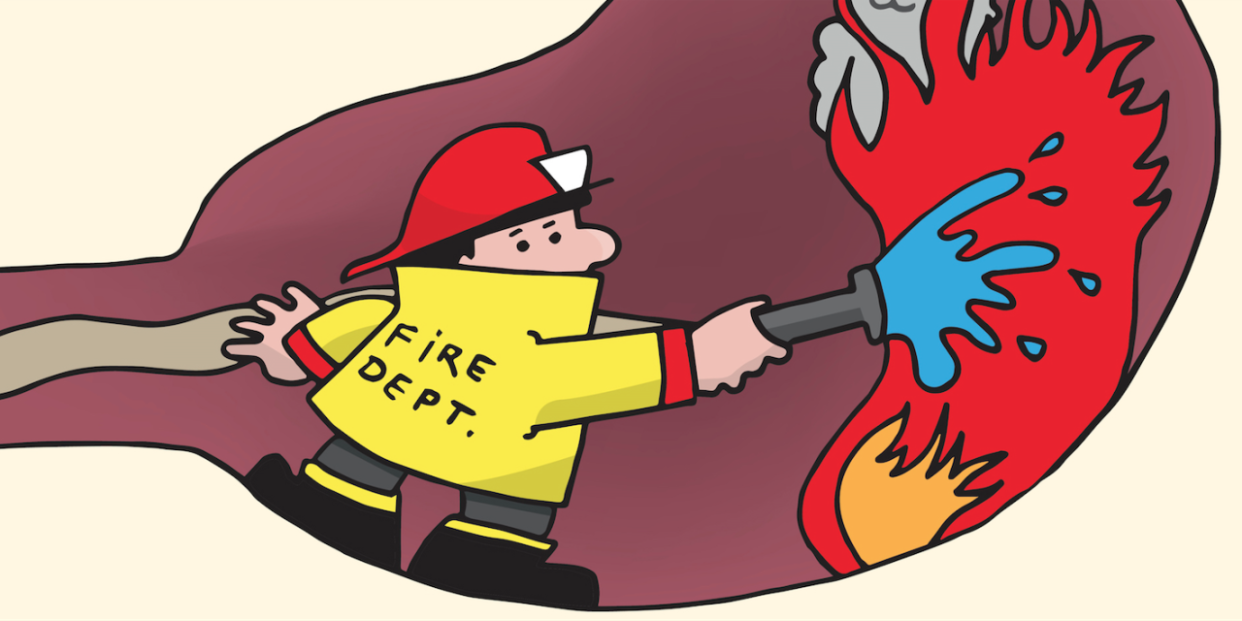10+ Surprising Acid Reflux Symptoms That Aren't Heartburn

Believe it or not, you may be suffering from acid reflux and not even know it. More than 60 million Americans experience heartburn at least once a month, and 15 million suffer from it daily, according to the American Gastroenterological Association.
Clinically referred to as gastroesophageal reflux disease (GERD), the digestive disorder occurs when stomach acid or bile travels up into the esophagus, irritating the lining. This chronic condition is worse than just indigestion, as GERD can damage the throat, lungs and larynx.
"We believe that lung cancer, throat cancer and esophageal cancer are all caused by reflux," says Dr. Jamie Koufman, founder of The Voice Institute of New York and author of Dr. Koufman's Acid Reflux Diet.
While daytime reflux often manifests as heartburn or indigestion, nighttime symptoms vary a lot more."When people have reflux, particularly at night, it sits in a polyp and leaks into the nose, throat and sinuses," Dr. Koufman says. "The mucus membranes not only get swollen and irritated, but they put out more mucus. We're talking bad lungs, bad sinuses, bad throats and bad voices — that's a lot of stuff."
If the issue becomes chronic, it can lead to complications like pneumonia while often going unidentified. "The three most common misdiagnosis in America, based on my experience with thousands of patients, are allergies, sinus disease and asthma," Dr. Koufman says. "The truth is many of these people are suffering from reflux."
The "Unusual" Symptoms
While the most common signs include chest pain, nausea and regurgitation, acid reflux often disguises itself in not-so-obvious ways. "Acid reflux affects the respiratory tract, so we're looking at allergy-type symptoms," Dr. Koufman states. These include:
Shortness of breath
Hoarseness
Vocal fatigue
Chronic throat clearing
Excessive throat mucus
Postnasal drip
Difficulty swallowing
Nasal congestion
Noisy breathing
Snoring
Choking episodes
The major underlying cause: diet. Eating late at night or shortly before working out are two common missteps, not to mention choosing the wrong foods.
"Diets high in saturated fat and added sugar — a.k.a. processed foods — can be big contributors," says Jaclyn London, M.S., R.D., C.D.N., Nutrition Director at the Good Housekeeping Institute. "Indulgent foods take longer to move through your digestive tract, giving them more time to cause the irritation that leads to acid reflux."
While many Americans will just pop a pill, the meds come with side effects. A recent study linked both prescription and over-the-counter remedies to severe kidney damage. Previous research found that continued use of proton pump inhibitors (PPIs) may lead to bone density loss, as well as an increased risk of heart attack and dementia.
The Good News
Dr. Koufman believes reflux is "completely reversible and curable" about 90% of the time. The remaining, most severe cases usually require reflux surgery, she says.
To avoid mild or moderate heartburn, London recommends eating lots of veggies, fruit, 100% whole grains, low-fat dairy and lean protein sources, such as nuts, seeds, legumes, eggs and fish. She also suggests cutting back on the high-fat foods if you're a regular reflux sufferer. That includes fried treats, ice cream, baked goods and pastries, particularly right before bedtime.
Staying upright is key to proper digestion, so laying down too early can contribute to heartburn and indigestion."Eating a heavier meal and then getting straight to bed is a major reflux culprit, so allow a minimum of 30 minutes between bedtime and your last meal," London warns.
Besides junk food, favorites like spicy dishes, peppermint, tomato sauce, garlic, onion, orange juice, coffee, wine and chocolate can also cause discomfort. "While many of these foods can be great for you in moderation, it's a good idea to limit them when you're trying to identify the problem," she says. "That way, you'll have a more informed approach when meeting with your physician to discuss treatment options."
You Might Also Like